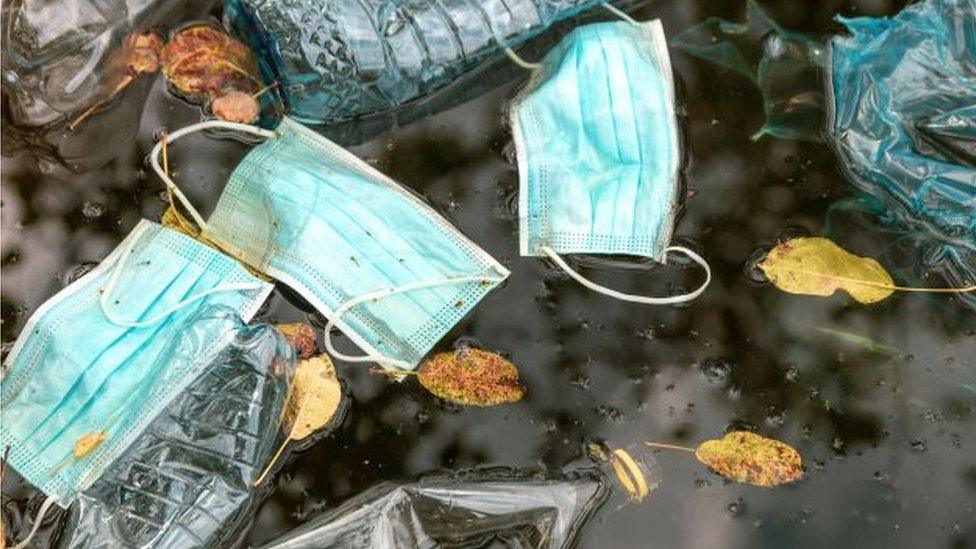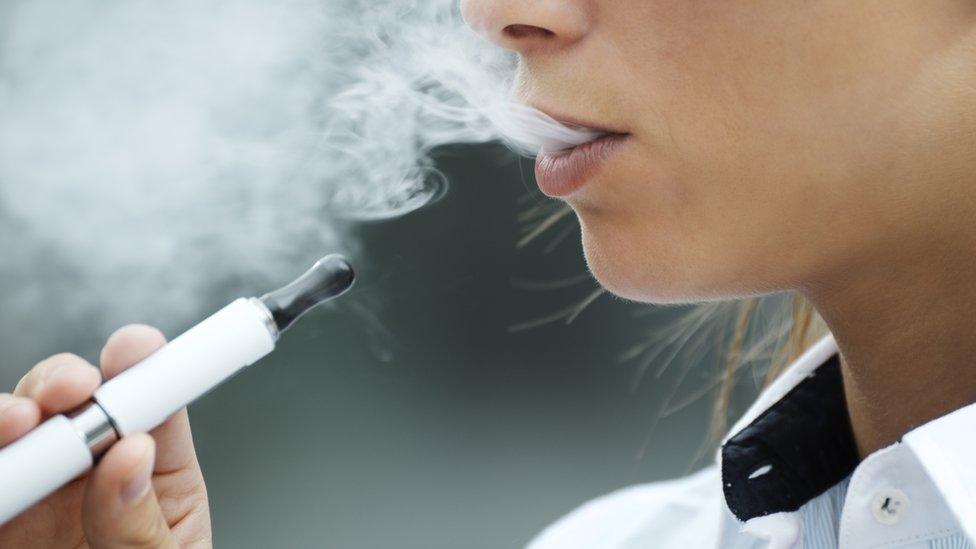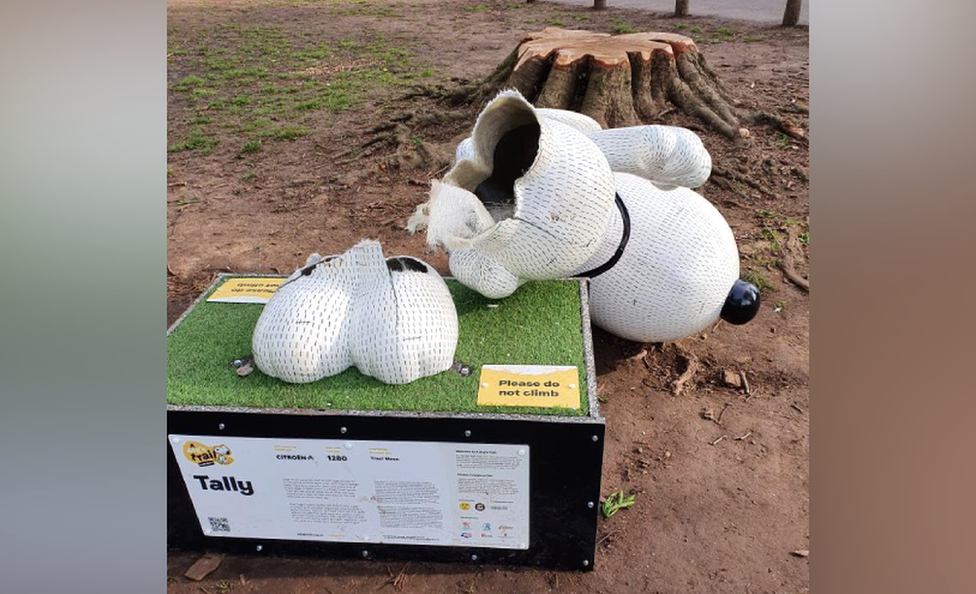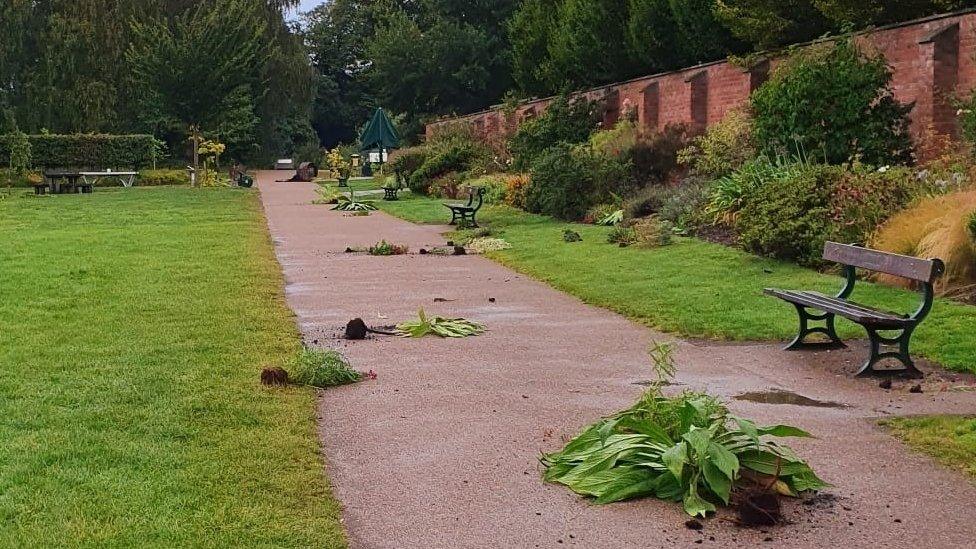Covid: Has lockdown led to bad behaviour?
- Published

Reports of litter, vandalism and abuse have left some questioning if lockdown might be to blame
After Covid kept us cooped up at home for months on end, with two years of restrictions, there are now concerns that the return of our freedom has sent some running wild.
During the first lockdown in 2020, many eulogised that our collective trauma would make us kinder and empathetic.
Others heralded the return of a community spirit not seen since the Blitz.
But after the lifting of restrictions have followed widespread reports of litter, vandalism, children swearing and vaping at school, and walkers defecating in beauty spots.
Prof Jennifer Austin, head of behaviour analysis at the University of South Wales, has been looking at whether lockdown has given rise to bad behaviour.

Prof Jennifer Austin, head of behaviour analysis at the University of South Wales, says it is "probably unhelpful to blame lockdown" for bad behaviour
Has the pandemic made us kinder?
Retiring as Archbishop of Wales in 2020, the Most Reverend John Davies warned that people's compassion towards others "must not vanish" after the coronavirus pandemic.
"People have been so supportive of others in their times of need, in their times of loneliness, sadly in times of their suffering and bereavement," he said.
"I hope that's going to last, that when restrictions are relaxed and maybe when it's all over, which hopefully it one day will be, that that sense of calling to be supportive, to be compassionate, to be kind, won't vanish with the pandemic - that would be such a great shame."
But, after so much community spirit and kindness shown during the worst of the pandemic, has this remained after the lifting of restrictions?
Prof Austin said: "I think that in some social contexts that has happened, particularly in our smaller communities where we have closer contact with people. Kindness and compassion, looking out for one another - we have seen more of that.
"I think there are two ends of the spectrum in terms of how our behaviours have changed. In some ways we have become kinder and more compassionate, but there is also then other repertoires of behaviour that have built up.
"I think that this pandemic created situations where we were all just struggling to do the best we can to deal with those things. And there are also examples of kindness and people reaching out and linking up with their communities in ways that they might never have done had we not had lockdown."
How has lockdown affected children?

Health experts say vaping can cause serious lung damage
Head teachers in Wales have warned of an increase in abuse towards teachers, deliberate vandalism and vaping.
In a letter, the heads of 11 secondary schools in Carmarthenshire urged parents to talk to their children about their "detrimental behaviour".
They said the challenges reflected the "national picture".
Rebecca Williams, policy officer at teaching union UCAC, said: "We may be coming out of the tunnel in terms of dealing with Covid as an illness, but we're only just beginning the journey to discover what the broader side effects of it all are.
"That's something that will take a long time."
Prof Austin told BBC Wales lockdown had meant children had lost some of their skills regarding appropriate behaviour, but added that children's behaviour was "very malleable and changeable".
"One thing that we have to remember is that our social behaviours are very much shaped by our social environment and we also forget that we practise our social behaviours every day.
"Those behaviours can be strengthened or weakened by the interactions that we have with others," she said.
"So a child swearing or vaping might be reinforced at home or with a peer group - that would not be reinforced at school or during after-school activities.
"When we lack a variety of social contexts such as in lockdown, we can lose important skills for differentiating which behaviours are socially appropriate to a given situation."
She added the effects on behaviour were the same for both adults and children.
"I'm a behaviour analyst and study the ways in which environment affects our behaviour and how we learn to engage in particular behaviours. Those principles are the same whether we are children or adults.
"Social environments will reinforce particular behaviours and strengthen those behaviours, regardless of how old we are."
Will we learn how to behave properly again?

Poo takes longer to decompose at higher altitudes
As unprecedented hordes of walkers made their way to beauty spots around Wales during the pandemic, complaints abounded that many were leaving a trail of litter and even human waste.
A Snowdon guide reported a path "covered in human stools" over Easter, while Mountain Rescue said human faeces had been found on paths on some of Wales' most popular mountains and warned of the health risks.
Meanwhile, a charity trail of Snoopy sculptures were smashed by vandals just days after they were places around south Wales in support of the Dog's Trust.

Sculptures of Snoopy were found smashed along a charity trail in south Wales earlier this month
But Prof Austin said lockdown alone could not be held responsible for such bad behaviour, adding that lost skills can be recovered as we rebuild our social interactions.
"I think that regaining lost skills is a matter of practise. It's much like when we go for a long while without exercising. We need time to build up our strength and our stamina. It's the same for social behaviours," she said.
"I think it's probably unhelpful to blame lockdown.
"We are living in a very unprecedented time and just trying to do the best that we can in order to keep people safe and to encourage people to engage in the right behaviours."
She added there is also a matter of to which degree social environments will expect and reinforce pre-lockdown behaviours.
"What we might find is that social norms have shifted during lockdown, our experience of such things as going to the theatre or a sporting event might be very different now," she said.
"But I do know, and what decades of behavioural analytic research shows, is that attempting to punish bad behaviour is not the right way to make lasting change.
"A much better approach is to design strategies where good behaviour is reinforced and maintained over time."

HEARTBREAKING DECISIONS: Families fleeing the war in Ukraine
WALESCAST: One-stop shop of what's happening in the world of Welsh politics

- Published18 April 2022

- Published2 May 2021

- Published28 April 2022

- Published10 September 2021

- Published27 April 2022

- Published26 April 2022
